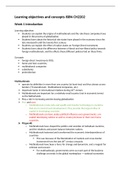Learning objectives and concepts ISBN CH2202
Week 1 Introduction:
Learning objectives
Students can explain the origins of multinationals and the role these companies have
played in the process of globalization.
Students learn about the historical role states have played in the economy since the
late nineteenth until the twenty first century.
Students can explain the effect of nation states on Foreign Direct Investment.
Students learn about the difference between a liberal and non-liberal policy towards
foreign multinationals, and the effects these different policies had on these firms.
Concepts
foreign direct investments (FDI),
home and host countries,
multinational companies
subsidiaries
protectionism
Multinationals:
operate by definition in more than one country (at least two) and thus always across
borders (‘Transnationals’, Multinational Companies, etc.)
Important factor in international relations during 20th century
Multinationals are important for a relatively small country (not in economic terms)
as the Netherlands
Play a role in increasing and decreasing globalization
Pros and cons
o Multinationals create jobs and wealth and transfer technology in countries
that are in need of such development. They provide the largest influx of
capital in developing countries.
o Multinationals can have undue political influence over governments, can
exploit developing nations as well as create job losses in their own home
countries.
Fitzgerald:
o Multinationals have shaped the politics and societies of individual countries,
and the relations and power balance between nations
o Multinationals hastened and transformed the economic interdependence of
countries
This was because of the liberalization of markets and cross-border
investment from the late 20th century onwards
o Multinationals have been a force for change and dynamism, and a magnet for
criticism and concern
For multinationals, governments were as much part of the business
challenge as trends in the global marketplace -> national economies
, did not develop in isolation: cross-border interaction and the transfer
of capital, technology, business practices and much else have
determined the fortunes of countries and their industries
During ‘the emergence of a global system’, multinationals played a
role in the developments.
Multinationals were at the center of a cumulative revolution, and
they were transporters and models of economic modernity.
o Globalization and multinationals:
Globalization envisages producers adopting best practice, while
consumers enjoy lower prices and improved goods and services.
The effects of globalization can be studied at the level of cross-border
transactions, nations, regions, and firms
Globalization considered at the level of societies:
Globalization considered nation states and their sovereignty
Focus on the levels of cross-border trade and investment
The role of the multinational enterprise
o Theory of FDI
o A multinational could acquire additional competitive
advantages for being abroad
o As a multinational’s international business evolved, it
became less dependent on sales within its home nation
o Definition of multinationals by Fitzgerald:
A multinational should have economic assets abroad
‘a firm that has the power to coordinate and control operations in
more than one country, even if it does not own them.’
A firm that owns or controls value-creating assets in more than one
country
o The role of states in the economy:
The lead of a nation or region accelerated the emergence of an
international system, and determined the flows of trade, capital,
technology and management practices.
Britain was significant to the international economy of the
nineteenth century
USA in the decades following the second world war
Europe exported a new and dynamic system of production
Through law, taxation, subsidies, regulation, and policies, the state
has been a strong influence on multinational business strategy,
corporate organization and employment.
Multinationals became a part of a complex transnational system of
bilateral and multilateral economic and political relationships
Foreign Direct Investment (FDI)
Multinationals invest directly in other countries
Outward FDI (Dutch multinationals investing in China)
Inward FDI (Chinese multinationals investing in the Netherlands
FDI is a measurement for multinational activity
FDI is a foreign investment with management influence
, Otherwise, portfolio investment (investing without having a say in the management)
Why?
o Companies need advantages over local rivals
o OLI
Ownership advantages
Locational advantages
Internationalization advantages
How?
o Multinationals invest directly in other countries in various ways
o Greenfield investment
o Acquisitions -> buying a firm/merging/take-over
o Joint ventures
o Licensing
o Cartels
o Strategic alliances
Fitzgerald:
o The effect of nation states on Foreign Direct Investment
Dynamic relationship between the development stage of a home
economy and its outward FDI.
In order to be successful in the long run, multinationals had to
operate in host nations
Multinationals gained and offered competitive advantages through
their ability to connect economies.
Tutorial 2 Wubs
o Countries invested most in the colonies. In 1914, Great Britain was the
biggest investor in FDI, because they had the most colonies
o Outward investments have drastically grown since 1990
China grew
Outward stock is as high as the Netherland
The Netherlands is one of the most international economies of the
world
o Inward investments
The Netherlands has a profitable location in Europe for trade, high
level of education, infrastructure, public poly, clustering
Historical background, culture of entrepreneurship
Home and host countries
FDI
Home country exercises outward FDI to a host country
Subsidiaries
Daughter company. A company owned or controlled by another company, which is
called the parent company or holding company
Protectionism




